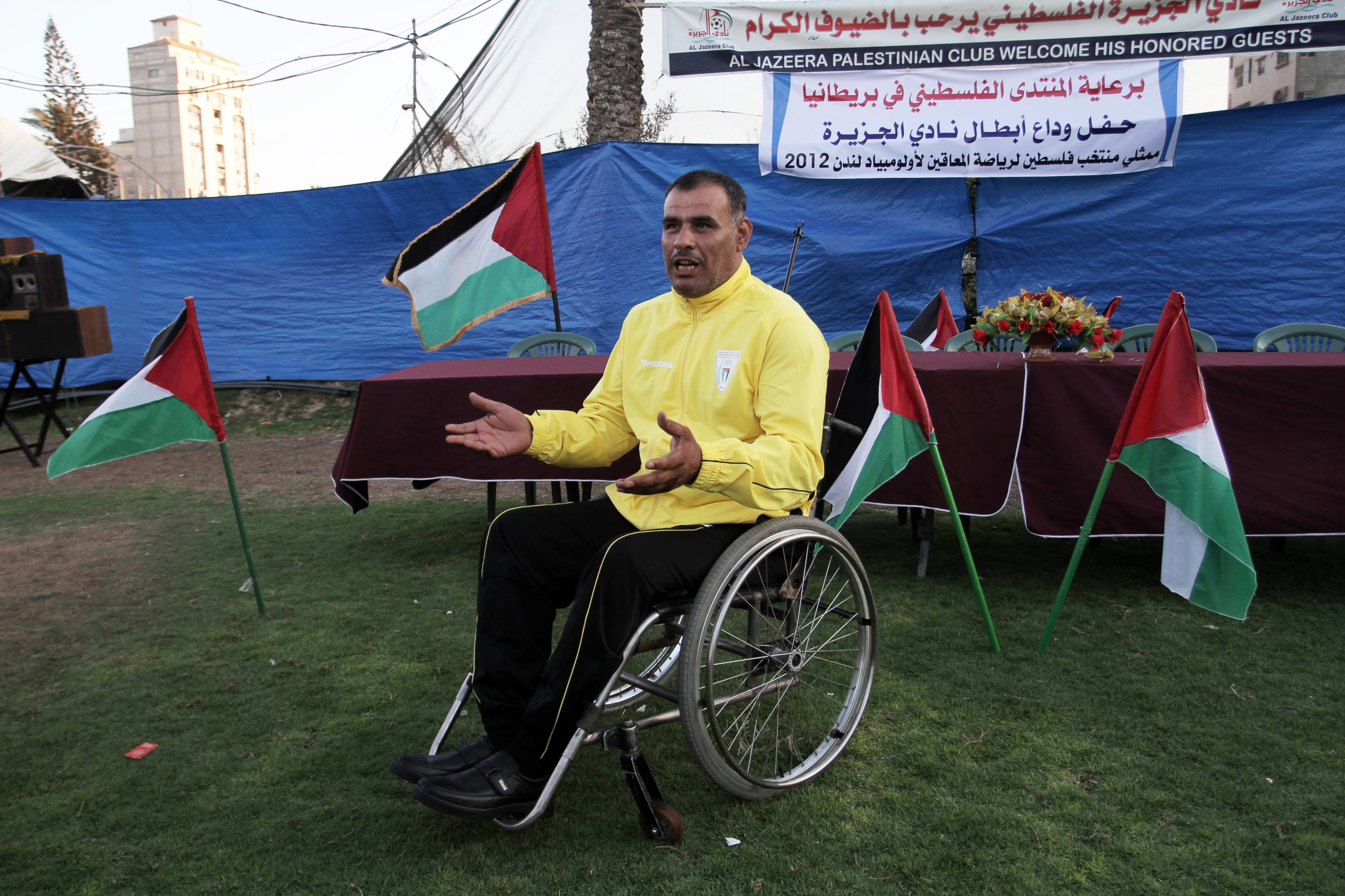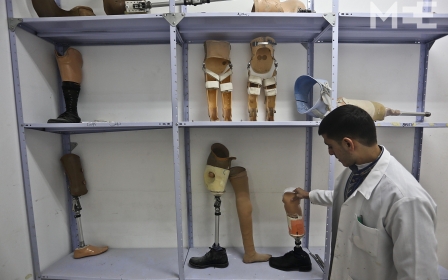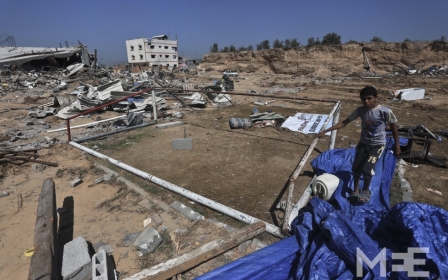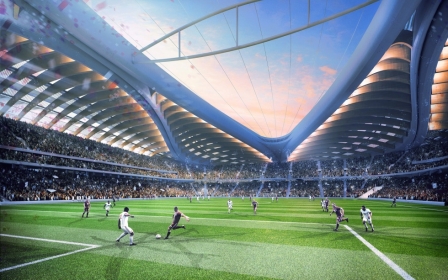The potential emergence of a Palestinian Paralympics team

It’s after hours at the Palestine Technical College for Girls in Ramallah, but the particular smell of sports halls – cleaning fluid, sweat and rubber mats – is still in the air. The native echo of squeaking trainers bounces off a too-high ceiling, and the small team warming up in the hall seem adrift in a large, empty school.
Four of the young men do a few laps while waiting for latecomers, jogging breezily round the hall in pairs. Most of the participants of today’s session are from Ramallah, but the coach, Thaer Daragmeh, has driven down from Tulkarem. It’s two hours away, but as one of only four qualified instructors for disabled athletes in the West Bank, it’s crucial for him to be here.
Encouraging but firm as he walks through the technical drills, Thaer explains how to quickly move from a crouch to an asymmetric plank. The players haven’t quite mastered it: they more frequently collapse laughing than get the move right, but the focus and strength the exercise involves is obvious.
Goalball is a new sport for these players, all of whom have a severe visual impairment. This week is their third practice, and over the course of the lesson their learning curve is steep. When they begin playing the game, which involves rolling a specially-customised ball into the goal of the opposing team, the men shoot beyond the goal and allow easy bowls through their defence. After half an hour, though, they’ve got the hang of it, even learning to push the ball with such precise momentum that it silences the bell inside, slipping imperceptibly into the goal.
Mohammed Iyad, 22, is one of the newest recruits to goalball, and he feels he’s improving with every training session. A student of social media and psychology at Al Quds University, he saw the sport as a good opportunity to get active and enjoy himself. “Sport is a good tool for people with disabilities,” Iyad explains as we chat after the game. It’s the language through which I can communicate with the wider community. I can use sports to discuss disability and reach out to those who might not otherwise understand my situation.”
Iyad has been active in the disability rights movement in the West Bank for several years, and runs and attends workshops that consider rights, needs and problems of visually impaired people in Palestine. “There is obviously violence against the rights of people with disabilities here,” he says. “The disability movement is weak. We are trying to recover the movement and we’re working hard – it’s not easy but we are trying to turn the tables.”
It’s a reserved assessment, but a realistic one. In Palestine, the unemployment rate for people with disabilities is 87 percent, compared to about 26 percent among the general population. In a context of occupation, when Palestinians are being killed, injured or incarcerated daily and the collective gaze looks to national liberation as a unifying struggle, more focused movements can run the risk of being side-lined.
Many of those problems that arise from occupation – and which, for most Palestinians here are a daily struggle – are magnified for disabled people in the West Bank. The checkpoints and roadblocks that restrict movement with barriers, metal detectors and soldiers checking passports behind thick glass are even more prohibitive for those with special needs. Health provision is poor and many of the specialist facilities disabled people need are located in Jerusalem, which West Bank Palestinians, split from by the separation wall, need an Israeli-issued and sometimes impossible to obtain permit to reach. Economic and political stalemate doesn’t help: the Palestinian Authority may have put a progressive law promoting the rights of people with disabilities in place in 1999, but after fifteen years it’s yet to be implemented.
Ehsan Idkaidek, the head of the Palestinian Paralympic Committee, has been battling these obstacles his whole life. When I first met him, he was overseeing an athletics competition, with participants from all over the West Bank, on a sunny Friday afternoon in Ramallah.
This day-long event cost organisers $2,500 – no small sum in the West Bank economy – for transport alone. But the outlay was no luxury. Running a vehicle, never mind one customised for people with impairments, is prohibitively expensive for most disabled people in Palestine, and public transport presents even tougher obstacles. If the costs and logistics of something as seemingly simple as transportation weren’t covered – in this case by foreign donations – the event’s target audience simply wouldn’t be able to come.
All that makes Idkaidek’s dream a tall order. No more than two Palestinians have ever before attended a single Paralympics games, but Idkaidek hopes to bring a full team – a goal that requires three to four years of training for each athlete – making it most likely that they'll be looking to the Games set to take place in 2020 in Tokyo.
“Reaching the next Paralympics will be a dream,” he says. “We need to pass qualification games in Asia, and to reach that, we need to attend many local and regional tournaments. That means we have to find big funds to cover the team expenses to attend the regional events.
With the small amount of foreign funding they’ve received, the group plans to bring coaches from the USA and Europe to train with budding paralympic athletes and those who hope to coach them. “We have physical, sight and intellectual disabilities in the group, but we don’t have the people with the technical knowledge to provide for these people. So what we need to do now is build people’s capacity to train people with disabilities. We want to have professionals to come to the country or to send Palestinians outside of the country to learn more,” Idkaidek says.
Daragmeh is a success story in this programme. Formerly a high school physical education teacher, he travelled to Leipzig in Germany to undertake an intensive course in sports training for people with disabilities for six months, and he’s now training athletes in several different sporting areas. But his skills are stretched. Daragmeh has been is running classes like today’s goalball practice entirely voluntarily, and can only travel to Ramallah once a week to help the goalball players. They need much more than that to get up to speed.
And at the end of last month, the most recent grant Idkaidek secured came to an end – leaving almost no money to cover even basic travel expenses for staff. The fact that most international funds are now being directed toward crucial humanitarian work in Gaza has made supporting the project even more difficult.
Disabled sports haven’t always been so neglected. In the past, Idkaidek says, there was more infrastructure for paralympic sports, but these were decimated, along with much else in the West Bank, by the second Intifada. Today, rehabilitation centres for injuries use sports as “as a tool, not as an object,” and occupational therapy or physiotherapy serves as medical treatment rather than an end in itself. But even as these centres were limited in what they offered, he explains, they were where teams were born as patients realised training could continue beyond treatment, and organised together.
So what differences are paralympic sports making for Palestinians with disabilities? “First of all, sports make a change for the people with disabilities in their health. Playing sports means you’re taking care of your disability,” Idkaidek says. “But from a psychosocial perspective, it’s important too. Someone who’s playing sports, he starts as a person who thinks he has nothing to do, who sees no value for his life. But when he sees he is playing sport he sees he can do something. He can run, he can go out, he can stay at his home, when he goes to the training sessions he has something to do with his life. He feels more confidence and he can understand the potential that he has. He can make more balance for his life, instead of being isolated he will also be in the society."
“It’s very important because the community itself needs to be made aware of disabilities. When the person with a disability comes from the community, and when he starts to play sport, he has a normal life. Because he starts to feel, “I am okay,” he’ll talk with other people. And that will give him more opportunities."
“I know a person with a disability who after he started playing sport he got married, he has a family. And he has good work,” Idkaidek continues. “It’s because he realised that he can live normally with his disability.”
In Ramallah, Mohammed Iyad was hardly lacking in confidence and accomplishment before he started playing goalball. But taking up the sport, he says, has also given him different hopes. Although it’s only his third training session with the goalball team, the sport has quickly become central among Iyad’s ambitions. He plans to become a strong athlete – maybe even professional level – and to play with a team in a national competition.
As the programme gains momentum, Iyad and Idkaidek are hopeful that more Palestinians will get involved in the paralympic project. But both are also sharply aware that there are profound obstacles to overcome. Funds continue to fall far short of what’s needed to keep the project thriving, as Idkaidek is quick to remind me. And after the blow that proactive sports work took during the unrest of the second Intifada, the continuing political instability across Jerusalem and the West Bank means the vulnerability of the Paralympic project has rarely felt as strong.
New MEE newsletter: Jerusalem Dispatch
Sign up to get the latest insights and analysis on Israel-Palestine, alongside Turkey Unpacked and other MEE newsletters
Middle East Eye delivers independent and unrivalled coverage and analysis of the Middle East, North Africa and beyond. To learn more about republishing this content and the associated fees, please fill out this form. More about MEE can be found here.




